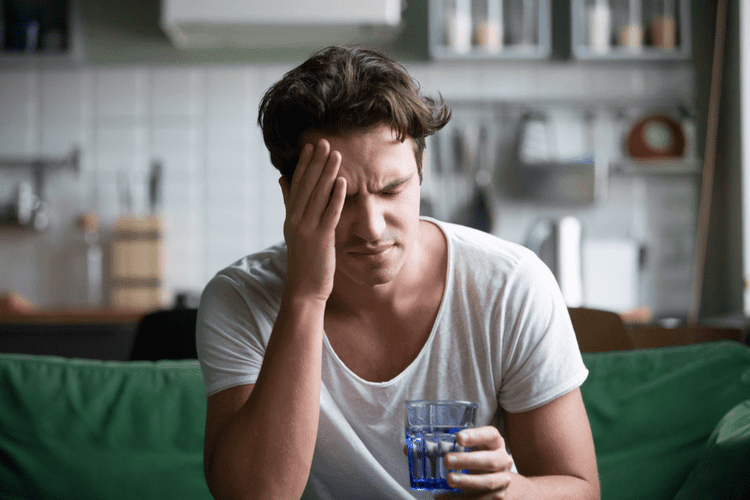You can stay hydrated and prevent dehydration by finding enjoyable ways to consume adequate fluids and increasing your intake of foods with a high water content. Excessive urination from drinking alcohol causes your body to lose electrolytes, which are important minerals involved in many bodily functions, including nervous system function (4). A good way to limit your overall alcohol consumption, and thus limit alcohol’s dehydrating effects, is to alternate alcoholic drinks with glasses of water. But, as Lindsey Pfau, M.S., R.D., points out, just one beer, for example, also has a lot of non-alcoholic fluids, which will help lessen the dehydrating effects of one beer.
Coffee, tea, and soda contain caffeine, a central nervous system stimulant that acts as a natural diuretic to increase urine production (1). These include times of illness (like when you have a fever), during and after exercise, in hot climates, and or when you are experiencing digestive issues like diarrhea and constipation. If your sweat output exceeds your fluid intake, you can become dehydrated. The rate people sweat and the composition of their sweat (how much sodium and other electrolytes) can vary widely. One complication of alcoholic ketoacidosis is alcohol withdrawal.
IBD and alcohol
It’s best to drink while eating or just after, and to snack as you continue to drink. When you don’t adequately replace this excess loss of fluids, you become dehydrated. So, you’ve been trying to drink more water, but you’re still feeling dehydrated. When you’re dehydrated, you have a lack of water in your body and your body doesn’t have enough water to perform its necessary functions.
Most guidelines recommend aiming for a total fluid intake of about 11.5 cups (2.7 L) for women and 15.5 cups (3.7 L) for men, which includes water from both foods and beverages (16). You can also pair the listed drinks with plenty of water throughout the day to help you stay hydrated. In addition, certain types of energy drinks contain other ingredients that could contribute to dehydration. Polyuria (excess urine) and polydipsia (excess thirst) are two symptoms of diabetes. They occur when there is a disruption in the metabolism of sugar (glucose).
Stick to drinks with lower alcohol content
Also, the ability to perform important tasks, such as driving, operating machinery, or caring for others can be negatively affected. Instead, consider the physical impact of chemicals like acetaldehyde – the primary culprit behind many of the negative after-effects of drinking. You absolutely should drink plenty of water while drinking.

Instead of drinking large quantities of water all at once, you may want to sip on fluids throughout the day as it may be easier for your body to handle. This can be from not drinking enough water or when you lose water quickly from sweating, vomiting or diarrhea and don’t match the does alcohol dehydrate you losses. Having a few drinks can be fun, but feeling dehydrated or hungover is not. It’s up to you to decide if the pleasures of alcohol are worth the potential next-day effects. Milk is also a good choice to help you rehydrate, assuming your hangover hasn’t put you off dairy.
How Quitting Alcohol Affects the Body
However, long-term drinking may cause a person to develop diarrhea or faster bowel emptying. If you’ve been drinking to cover anxiety or to cope with life stressors, you may find getting sober and having to deal with issues and daily struggles overwhelming. Even though it’s a negative coping technique, alcohol use for stress is still a coping technique, and any time you’re trying to make a big life change, it’s going to be challenging. Stress can make it harder for the body to keep up its energy levels and make it difficult to sleep, both of which can lead to fatigue. Remember, withdrawing from alcohol can be dangerous and even life-threatening. If you or someone else is planning to stop drinking after heavy, long-term use, it’s crucial to seek medical supervision.
How much alcohol should you be drinking in your 50s? – The Telegraph
How much alcohol should you be drinking in your 50s?.
Posted: Wed, 08 Nov 2023 13:14:00 GMT [source]
It affects every system in your body and puts you at risk of life-threatening health problems. Because the sense of thirst can decline with age, older adults are at higher risk of chronic dehydration. Drinking responsibly can reduce your chances of getting dehydrated after drinking alcohol. Drinking water, putting electrolytes in your body, and reducing the amount of alcohol you drink can help you avoid dehydration. You can help prevent dehydration by drinking plenty of water throughout the day and taking electrolytes if you start seeing early signs of fluid loss.
Common Chronic Dehydration Causes
That’s why it’s important to increase water intake during hot weather or when you’re ill. Dehydration occurs when you cannot consume enough fluids to keep up with your losses. An increase in fluid loss can occur during extreme heat, prolonged exercise, bouts of illness, medication intake, or due to certain conditions. Many of these medications work by preventing reabsorption of fluids. It’s important to ask your healthcare provider about the medicines you take and whether they can increase your risk of dehydration.